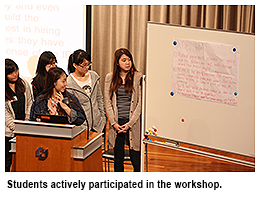CityU hosts conference on student intellectual property
The conference, titled “Institutional Policy and Practice of Student Intellectual Property Management in Hong Kong Higher Education,” was organised by the Centre for East Asian and Comparative Philosophy (CEACOP), the Department of Public Policy, the Office of Education Development and Gateway Education, and the Knowledge Transfer Office (KTO).
Funded by the University Grants Committee, the conference brought together professionals from local and overseas institutions to exchange experiences and share views on student intellectual property, investigate the current state of student intellectual property management within the modern university setting, and explore ways in which policies can be produced.
Professor Philip Ivanhoe, Chair Professor of East Asian & Comparative Philosophy & Religion at the Department of Public Policy and Director of CEACOP, welcomed all speakers and participants at the opening of the conference.Professor Arthur Ellis, Provost, delivered the opening remarks saying that with the launch of the Discovery-enriched Curriculum, which emphasises discovery and innovation at CityU, undergraduate students had many opportunities to create new knowledge and come up with original creations and new inventions which should be protected.
On the first day of the conference, Ms Kirsten Leute, Associate Director of the Office of Technology Licensing at Stanford University, shared her experiences of managing intellectual property at Stanford and steps to start a company.
Other guest speakers were Mr Charles Valauskas, Legal Counsel at Valauskas Corder LLC (Chicago), Dr Alfred Tan, Head of the Knowledge Transfer Office at Hong Kong Baptist University, and Dr David Ai Chuan, Director of KTO at CityU.
Students who participated in the workshop on the second day of the conference were given three actual cases and divided into groups to discuss practical considerations and common student intellectual property problems.A web-based resource will be set up later for the public, informing them about current student intellectual property management and about ideas on how to improve such policies.


